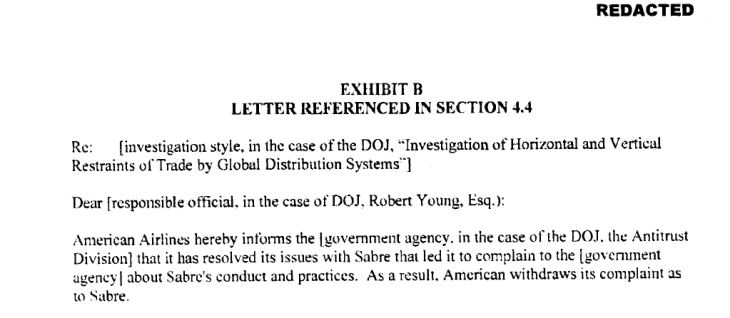Skift Take
American Airlines looks like the clear winner in its settlement with Sabre as the antitrust issue clearly took a back seat to using the courts to ram through a better deal for the airline.
Now that the redacted settlement papers have been filed with the bankruptcy court, Sabre looks from outward appearances to be the big loser in its protracted dispute with American Airlines. But, Sabre was right all along about one thing: the pitched battle between the airline birth parent and its GDS offspring was never about the antitrust issues that American brought to the fore. It was always about economics, and using the courts to negotiate a better deal for American.
In fact, if the court handling the AMR Corp. bankruptcy case approves the final settlement and related agreements that the two sides are still negotiating, and that’s expected to come around January 31, 2013, then American is instructed to contact within three days the U.S. Department of Justice, the DOT, and other governmental authorities “anywhere in the world” which are considering American Airlines antitrust complaints, and instruct them to withdraw the complaints.
However, while the American Airlines-Sabre settlement halts their federal and state court cases, it does not stop the airline’s complaints against Travelport and Orbitz Worldwide, and antitrust litigation brought by US Airways against the GDSs.
Smokescreen for better deal
Sabre had argued all along that American’s antitrust complaints were a smokescreen, and that the airline was using the courts to negotiate a better deal — and apparently the airline succeeded, as Sabre caved once its practices to block American’s direct-connect push got a public airing in late October.
The settlement papers describe the agreements as a “compromise,” but Sabre seems to come out on the short end as it must make a series of cash payments to American, and also provide the airline with a credit toward American’s payment for the availability, reservations, and departure control services that Sabre provides to American.
In other highlights of the agreement, American Airlines continues to provide its fares and inventory to the Sabre GDS; Sabre continues to provide reservations services to American through June 30, 2016; Travelocity continues to get access to the airline’s flights; Sabre pledges not to bias American’s flights, and American gets authority to continue its direct-connect drive — one that cuts out the GDS and establishes direct links between the airline and travel agencies and corporations.
Airline reservations system talks
Another very important aspect of the settlement is that American and Sabre are exclusively negotiating a new agreement to extend the airline’s use of the SabreSonic reservations system beyond 2016.
Given the longstanding acrimony between the two companies, that negotiation will be a tough one to pull off, although switching airline reservations’ systems providers, as American unsuccessfully tried to do with HP, can be a tumultuous endeavor.
However, if American does decide to break with Sabre as its airline reservations system provider, the settlement provides assurances to the airline that Sabre can’t make any hanky panky, and must cooperate and provide transition services to American.
The Daily Newsletter
Our daily coverage of the global travel industry. Written by editors and analysts from across Skift’s brands.
Have a confidential tip for Skift? Get in touch
Tags: american airlines, antitrust, gds
